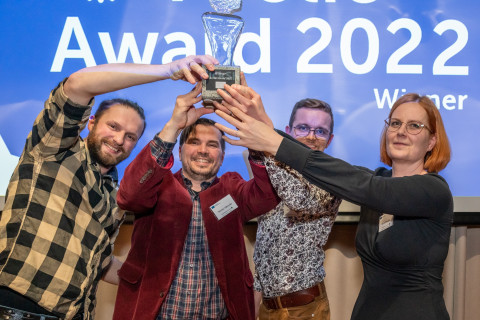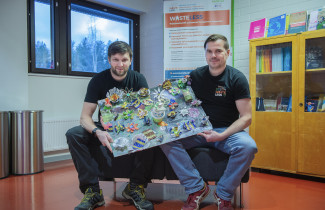Improving waste management in villages in North Karelia, Finland, and in the Karelian Republic, Russia, the WasteLess Karelias project was announced as the winner of the 2022 Arctic Award in an award ceremony held in Oulu on 25 January. The winner was selected by public vote.
“We’re really happy to receive this award as it is a recognition of our teams’ and projects’ many efforts to work with the people in our project villages, as well as of the dedication that the local residents have shown towards our project. This award shows that there is a benefit also for academics to do more than writing papers and recommendations, i.e., to combine this with active work in the communities that we hope to support,” says Associate Professor Moritz Albrecht, Coordinator of the WasteLess Karelias project.
The project collaborated closely with local residents and stakeholders to improve waste management in the villages. According to Albrecht, this was a key reason for being nominated for the 2022 Arctic Award.
“Winning the public vote, seemingly by a landslide, confirms that many people felt being actively engaged with the project.”
Finnish partners, and especially the Association for Rural Culture and Education, played a key role in activating residents in the Finnish villages.
“The award is a great recognition of the grassroots-level work done in the villages. Local residents’ activeness in developing their own community’s environmental affairs was one of the best outcomes of the project. Collaboration between research, development and village-level work was a strength of WasteLess Karelias,” says Village Developer Reeta Rönkkö of the Association for Rural Culture and Education.

Carried out in 2018–2022, WasteLess Karelias sought to prevent littering and improve waste management in the participating rural villages in North Karelia and the Karelian Republic. Local residents, authorities and businesses were encouraged to improve recycling and the cleanliness of their surroundings. The project also analysed the current state of littering in the villages, as well as the attitudes, knowledge and willingness of local actors and residents to recycle and reduce waste. Waste sorting stations were set up in the rural villages, and clean-up campaigns were organised. The project also organised trash art workshops and a Trash Art Festival in Joensuu.
The WasteLess Karelias project was led by the University of Eastern Finland, with the Finnish partners including the Association for Rural Culture and Education, and the Finnish Environment Institute (SYKE). Following Russia’s invasion of Ukraine, all collaboration with the Russian partners was frozen.
The Arctic Awards is an annual project competition designed to highlight exceptional projects focusing on topics of particular relevance to the Arctic area. The competition is open to projects that receive funding from the European Union’s Arctic programmes, i.e., the Northern Periphery & Arctic Program, Interreg Botnia – Atlantica, Interreg Nord, Kolarctic CBC and Karelia CBC.
The objective of the competition is to identify good practice, promote Arctic cross-border collaboration, and raise awareness among projects of each other. Finalists are selected while highlighting innovative projects that have a clear Arctic dimension and are of direct benefit to Arctic communities.
Other finalists shortlisted for the 2022 Arctic Award were, besides WasteLess Karelias, GRUDE, which focused on green rural economy and resource efficiency, and FAIR, which promoted early and efficient commercialisation of electric regional flights in the Kvarken region.
For further information, please contact:
Associate Professor Moritz Albrecht, tel. +358 50 337 1783, moritz.albrecht(at)uef.fi


